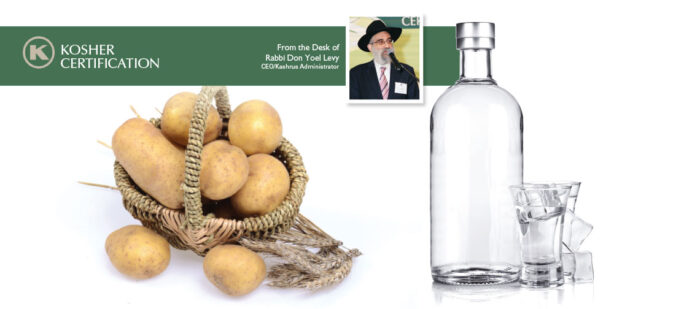Tequila has become increasingly popular in the Jewish world, coinciding with a staggering increase in tequila popularity among the general population. Vodka and whiskey are no longer the primary options at social events and shul kiddushim. Tequila, especially artisanal varieties, is now ubiquitous. You probably know a few tequila brands, and might have a favorite tequila cocktail, but do you know how tequila is made?
Tequila is derived from the agave plant, a succulent native to the Americas, recognized by its rosette shape and large, fleshy leaves. Indigenous peoples in Mexico and other parts of the Americas have traditionally used agave for food, medicine, fermented beverages, and more.
There are several varieties of agave, but blue agave is the type used for tequila production and is native only to certain regions of Mexico.
In contrast to the raw materials used in other spirits, such as whiskey and vodka, which reach maturity in a short period, blue agave plants take 7 to 10 years to mature enough for use in tequila production and are sometimes harvested before reaching full maturity due to production needs. Strong and skilled field workers harvest blue agave using a curved axe called a “coa” to cut off the agave leaves and expose the heart, which is the part used for production, and the agave hearts are loaded onto trucks and transported to the distilleries. The Tequila Regulatory Council (CRT) authorizes all production facilities, which must comply with the standards and regulations established by the Official Mexican Standard (NOM) for tequila production.
At the distillery, agave hearts are cut into two or four parts and put in ovens or autoclaves (a type of pressure cooker) to begin the cooking process, typically using direct steam. The agave is cooked for 24 hours in an oven, or about 12 hours in an autoclave. Cooking the agave converts starch into sugars, extracts rich juices, and develops sweet, smoky, and caramelized flavors.
After cooking, the agave is crushed using mills to extract the juice. The juice is transferred to stainless steel tanks to begin the fermentation process, where yeast consumes the sugars and converts them into alcohol. Typically, commercial yeasts and nutrients are used; however, fermentation can sometimes be achieved with naturally occurring yeasts from the agave. Organic tequila does not use commercial yeast, and, in such cases, the fermentation process takes longer.
The fermented agave juice, called “must”, undergoes distillation with stills, boilers, and condensers, where it is heated to purify and concentrate the alcohol. The resulting product is tequila blanco (white). There are aged tequilas that remain in barrels for specified periods according to regulations. Blanco (silver) tequila is aged for up to sixty days or not aged at all, Reposado is aged for two months to one year, Añejo is aged for one to three years, and Extra Añejo is aged for over three years.
American oak barrels are commonly used to mature the tequila. They can be new barrels or ones previously used for whiskey. These barrels impart unique flavors and characteristics to the tequila during its aging process. After the maturation process is completed, the tequila is filtered and diluted to the desired alcohol level, bottled, and sold.
DOES TEQUILA NEED KOSHER CERTIFICATION?
OK Kosher certifies over three dozen tequila brands, and we are contacted daily by companies looking for kosher certification for their distilleries. As the OK Regional Representative to Latin America and a native Spanish speaker, I have traveled to numerous distilleries to train company staff in kosher requirements and guide them through the certification process.
Our experience in the field has shown us that companies like to innovate and use different types of barrels, including those previously used for wines and brandies. This poses a problem for kosher consumers because sometimes this information is not declared on the bottle.
If the tequila did not achieve the desired color during the aging process, caramel color can be added to the tequila.
Most consumers do not know that the governmental regulations for tequila production allow adding some additives without needing to declare them on the ingredient panel, including oak extract (a flavor produced using alcohol) and glycerin, which improves smoothness and mouthfeel. If your tequila tastes too smooth, it quite likely contains glycerin. Glycerin can be of animal or vegetable origin, which can be a serious kosher concern.
Another issue to consider is the transfer of tequila between production facilities: one distillery may produce tequila to sell to a second company so that the second company can bottle it under their own brand. Here we have two considerations: 1) Is the original producer kosher certified to a high standard? 2) The truck transporting the liquid must be kosher certified especially because alcohol is considered davar charif (sharp).
There is a fairly new product called Añejo Cristalino. It is tequila aged in barrels, but after the aging period, it is filtered to remove the color and retains only the flavor imparted by the barrel. I was invited to a meeting where they offered an Añejo Cristalino without a kosher certification on the bottle, but the label indicated that it was aged in wine barrels. The host was mistaken in thinking that the colorless nature of the tequila meant there was no risk of it being aged in wine barrels. One must pay special attention not to confuse it with tequila blanco.
When it comes to Pesach, all the sensitive ingredients mentioned above have a risk of being chometz (or at least kitniyos). Therefore, tequila requires special certification for Passover, regardless of the type of tequila.
The OK recommends consuming tequila with a reliable kosher certification year-round to avoid all possible concerns. I have personally visited dozens of distilleries, consistently uncovering new insights, many of which have direct implications on kosher standards. As a result, the OK continuously reviews the kosher requirements to truly provide a product that is kosher without compromise.


 EN
EN  ZH
ZH  KR
KR  BR
BR  ES
ES  IN
IN  IL
IL  JP
JP 




